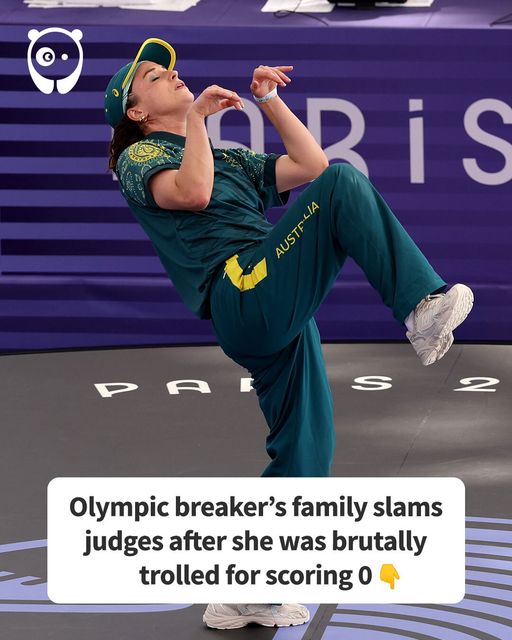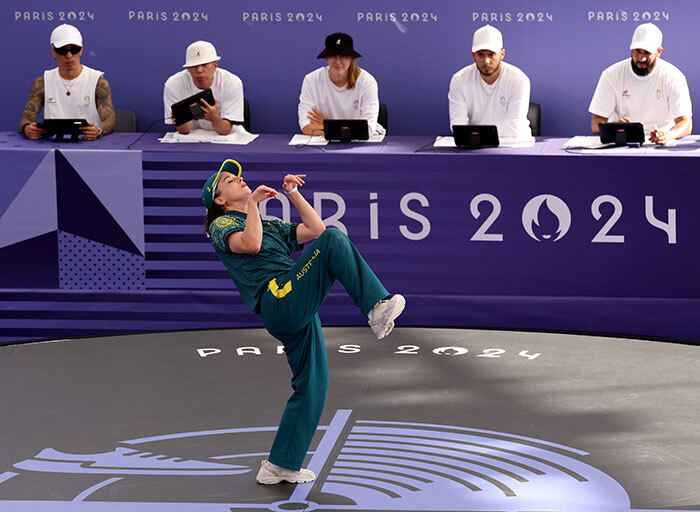O
Australian breakdancer Rachael ‘Raygun’ Gunn‘s Olympic debut may have been met with mixed reviews, but her husband and father-in-law have passionately rallied around her with unwavering support.
Competing in the first-ever Olympic women’s breakdancing event, the 36-year-old stirred up quite the controversy after her performance included some unique moves and kangaroo-like hopping steps.
- Rachael ‘Raygun’ Gunn stirred controversy at the 2024 Paris Olympics with her unique breakdancing moves.
- Despite her efforts, she scored 0 points against competitors from the USA, France, and Lithuania.
- Her family defended her performance, arguing that judges overlooked her creativity and unique style.
- “In my obviously biased opinion they did not reward originality and musicality so she was up against it,” her father-in-law said.
“What I wanted to do was come out here and do something new and different and creative – that’s my strength, my creativity,” she said post-event.
The family of Australian breakdancer Rachael ‘Raygun’ Gunn staunchly defended after she failed to score a single point at the 2024 Paris Olympics
Image credits: Ezra Shaw/Getty Images
Despite her best efforts, she didn’t score any points against competitors from the USA, France, and Lithuania, losing all three round-robin battles with scores of 18-0, 18-0, and 18-0.
The internet ran wild with their mockery of the breakdancer’s performance, with even talk show host Jimmy Fallon including a cheeky tribute to her on his show.
However, her father-in-law, Andrew Free, fiercely defended her performance, arguing that the judges overlooked her unique style and creativity.
The 36-year-old breakdancer was not only the target of jokes online, but she was even mentioned by singer Adele on stage. Jimmy Fallon also paid a cheeky tribute to her on his show
“It was a pretty stacked competition and the judges were clearly looking for a certain style of breaking which is not Rachael’s,” he shared on social media.
“Although they are supposed to mark five different aspects with each having the same weighting, in my obviously biased opinion they did not reward originality and musicality so she was up against it.”
“The main thing is she represented Australia and breaking at the Olympics with courage and dignity,” he added.
Raygun grew up performing jazz, ballroom, and tap, and she was introduced to breakdancing in university by her now-husband and coach, Samuel Free
Raygun’s path to the Olympics was hard-earned, as she secured her spot at the Games by winning the Oceania Breaking Championships last year.
After growing up performing jazz, ballroom, and tap, she was introduced to break-dancing at university by her now-husband and coach, Samuel Free.
The couple met in 2008 and married in 2018, and they have since dedicated their lives to her breaking career.
When she is not busting her moves on stage, the Australian champion channels her passion for dance into academia.
Holding a Ph.D. in Cultural Studies, she is a researcher and lecturer at Macquarie University in Sydney. Her academic interests are in the “cultural politics of breaking,” according to her university biography.
The Ph.D. holder is also a researcher and lecturer at the Macquarie University in Sydney
Her research interests include subjects like breaking, street dance, and hip-hop culture; youth cultures/scenes; constructions of the dancing body; politics of gender and gender performance; and ethnography.
After she became a viral sensation, head judge Martin Gilian, known as MGbility, from the Olympics came to her defense and praised her for “bringing something new to the table.”
“She got inspired by her surroundings, which in this case, for example, was a kangaroo,” he said at a news conference.
“In my obviously biased opinion they did not reward originality and musicality so she was up against it,” said the father-in-law of the Australian breakdancer following the controversy
“We have five criteria in the competitive judging system and just her level was maybe not as high as the other competitors,” MGbility continued. “But again, that doesn’t mean that she did really bad. She did her best. She won the Oceania qualifier… unfortunately for her, the other b-girls were better.”
Australian Prime Minister Anthony Albanese also defended her and said, “(It’s an) Australian tradition of people having a go. She’s had a go representing our country and that’s a good thing.”

